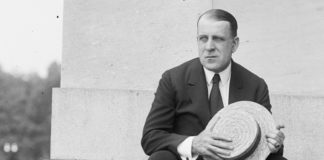I still maintain that the day I interviewed the director of the Melbourne Theatre Company, Virginia Lovett, about the heart-breaking lockdown cancellation of actor, singer, comedian and writer Virginia Gay’s play Cyrano, was the only time in all radio history when a Virginia interviewed a Virginia about another Virginia.
Prove me wrong. Find another instance.
Our conversation is memorable for me for another reason, however: written in lock-down as a love letter to hope, desire, and the power of language to break open hearts, Gay wanted this play to welcome weary Melburnians back into the theatre as the city finally re-opened.
Famously, distressingly, opening night was cancelled three hours before the city went back into lockdown for the sixth time.
I’ve always described lockdown number four as the one that broke this city’s heart.
Lockdown number six is one we can barely bring ourselves to remember.
Still in shock from the sudden shutdown, I asked Virginia to join the Q+A panel, where she delivered a monologue from the as-yet-unseen play that unexpectedly went to the heart of what so many had been missing, what we had been cut off from for too long. It became a signal moment in the pandemic for artists around the country whose voices had been silenced, and Virginia has since told me that her life has divided into the time before and after that broadcast. Something enormous shifted, she said.
Loading YouTube content
An old tale re-imagined
Cyrano is the story of someone who has found refuge and comfort in the things that keep them isolated from others: their brilliant mind, prodigious language and terribly big nose. No one will ever love them, least of all the glorious Roxanne, so why strip off the armour that keeps them safe? Words are excellent weapons.
The original 1897 play — its story, protagonist and moral — has proven irresistible for more than a century: a smart man, a witty and verbal man who can love with his words and his mind but who is as insecure as any woman might be about her body. The interpretations write themselves. I think there are more than 20 known adaptations and translations and dozens of stagings with many Cyranos played by Derek Jacobi, Richard Roxburgh and James McAvoy, among others.
Virginia Gay flips Cyrano’s gender, and as she did with her award-winning Calamity Jane, she finds the queer and the wonderful in a love story that swirls the original text into a raspberry ripple of contemporary language, sweet and sharp and mellow.
People from the theatre tell me that crowds are very slowly returning to the nation’s auditoriums, but they are not packing the theatres even as our stages are crowded with some of the best productions of a decade. The figures are alarming and as the Melbourne Symphony Orchestra’s managing director, Sophie Galaise says: “We’re not going to, and we’re not even trying to, get back to pre-pandemic levels. We have to see the world in a new way.”
There is something in this play that makes sense of our caution. I kept thinking of another comedian, one just as literate and just as playful as Gay, who was also drawn to the bittersweet folly of Cyrano.
He nose a joke
US comedian Steve Martin (who once wrote a play about Picasso and Einstein chatting in a bar about art and science) rewrote the text for his film Roxanne, playing the embattled, witty but nasally overburdened protagonist himself. (His scene of self-deprecating big nose jokes has gone into comedy legend. Gay returns serve with a brilliant arpeggio of gags of her own.)
Loading YouTube content
In a still, sweet moment from Roxanne that has always stayed with me, Martin as Cyrano shrugs off a comment that could see him in yet another fight, as he is just too happy to quarrel: so why doesn’t he take offence this time? He smiles: “Because yesterday she didn’t, but today — she does.”
Last year, Virginia Gay couldn’t, but this time, she can, and like Martin, Gay finds in her play the longing and the vulnerability in that moment of hushed bravery that we all must take if we are going to step into the moment and ask for the love that we want, to declare ourselves and take the consequences. After almost three years of isolation and withdrawal it’s an invitation to take risks again.
This weekend we take you to bed, we cook for you and we teach you how to handle a good ticking off. Cyrano would approve of all of this.
And if we are going to talk about love, then play on. And go well.
Loading YouTube content
Virginia Trioli is presenter on Mornings on ABC Radio Melbourne.







